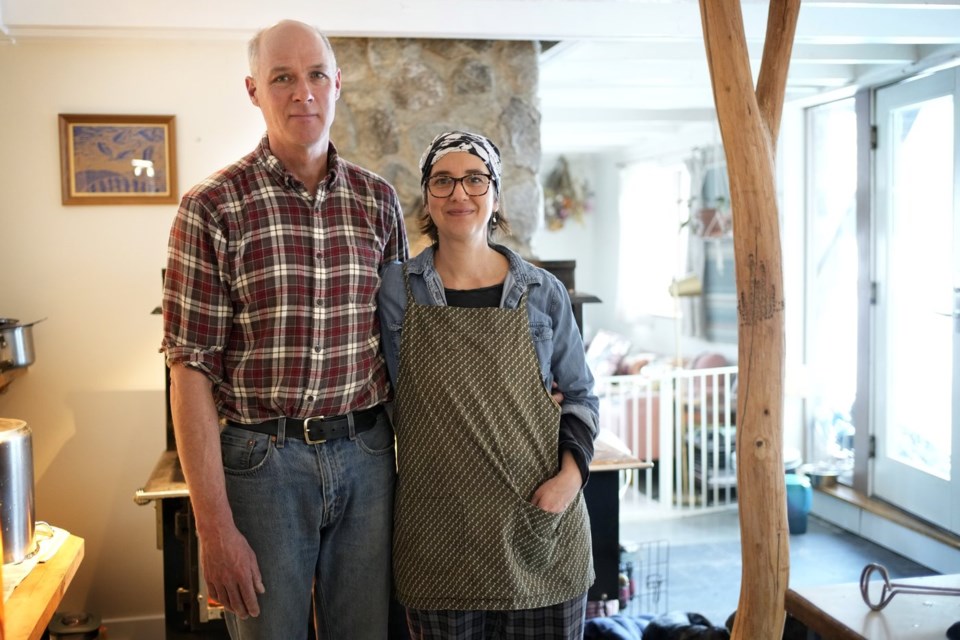A freeze on federal loans and grants is creating turmoil for some rural U.S. business owners who fear they won't get reimbursed for new, cleaner irrigation equipment or solar panels they purchased with the promise of a rebate.
In Cherryville, Maine, Hugh Lassen and his wife and two teenagers grow organic, wild blueberries on their Intervale Farm. Last year they purchased solar panels to run their home, a blueberry sorter and 14 freezers. They did it thinking they'd get an $8,000 grant through the Rural Energy for America Program.
“It’s never the right time to spend $25,700,” Lassen said. “It’s a huge amount of money for us because we’re pretty small … you also have college expenses looming.”
President Donald Trump on giving out these funds, but federal judges have said departments can disburse them. Yet many departments have not resumed writing checks, so questions remain for some business owners who spent years making plans for improvements they could afford only with grants.
“We’ll just have to suck it up if somehow the funding doesn’t come through,” Lassen said.
REAP, offered through the U.S. Department of Agriculture, is . It provides grants to small businesses in rural areas so they can generate clean energy or improve their energy efficiency. Besides solar, it has helped fund wind turbines, electric irrigation pumps to replace diesel ones, and corn ethanol.
Once a business gets approved for REAP, it purchases the technology and operates it for at least 30 days. Then a USDA agent comes out personally for verification and barring any problem, the check gets issued.
Some people have spent months on their applications.
Deanna and Christopher Boettcher run Mar Vista Farm and Cottages in Gualala, California, and began their REAP application in 2023. They put in time going over plans with contractors and filling out paperwork for 48 solar panels to cover about 80% of their electricity needs.
The day they received approval to buy the panels, the funding freeze was announced.
“I am speechless,” Deanna Boettcher said. “Absolutely this will change my plans. There is no way we can build the solar system without the funds ... So many obstacles and hurdles they put in the way, and to finally get there and then this.”
Their solar system cost $82,600. REAP is supposed to cover half. “We’re not going to even think about starting it unless we know that it’s not frozen … so we’re back to where I was two years ago.”
Lassen stressed that lower energy costs make farm products cheaper to make, allowing them to be priced lower. Solar and wind are appealing to remote communities because they can be cheaper than traditional energy sources, such as diesel generators and irrigation pumps.
Grants have proven to be a major driver of new clean energy projects in rural areas because they lower the price tag.
But the Trump administration believes the role of government should be far more limited. Rather than solar power or energy efficiency, Trump has spoken often about his , erasing environmental and climate policies created under the Biden administration. His key advisor, billionaire Elon Musk, has said the government should scrap all federal tax credits and subsidies.
Russell Vought, the newly-confirmed , co-authored the conservative agenda for Trump’s second term, Project 2025, which criticized renewables like wind and solar and encouraged more oil and gas usage.
USDA leaders “have been directed to assess whether grants, loans, contracts, and other disbursements align with the new administration’s policies,” according to a statement from a department spokesperson who noted that Brooke Rollins, USDA secretary nominee, “will have the opportunity to review the programs and work with the White House to make determinations as quickly as possible,” once she's confirmed.
The Lassens' solar system has a Tesla inverter, which converts direct current from the panels to the alternating current used on the property. Hugh said this puts him in a “funny place where we’re benefitting from the brainpower,” but could also suffer from Elon Musk’s “slash and burn cost-cutting" efforts.
“Farmers and small business owners throughout Appalachia and rural America are struggling to stay afloat,” said Chelsea Barnes, director of government affairs and strategy at Appalachian Voices, a nonprofit focused on sustainability. For people who have been awarded REAP funding and made purchases but haven't been reimbursed, "that will cause significant financial harm.”
REAP originated with the 2002 Farm Bill and has long enjoyed strong bipartisan support for energy self-reliance, with money flowing in via farm bill legislation and the Inflation Reduction Act. The program has spent $2.4 billion total since it was created and about half of that came from the Biden administration IRA, passed in 2022.
“It’s really counterproductive to go after a program that does so much to help farmers bring down their costs. This is something that everybody agrees on. It primarily benefits Republican districts," said Andy Olsen, a senior policy advocate at the Environmental Law and Policy Center.
___
The Associated Press’ climate and environmental coverage receives financial support from multiple private foundations. AP is solely responsible for all content. Find AP’s for working with philanthropies, a list of supporters and funded coverage areas at .
Isabella O'malley, The Associated Press




